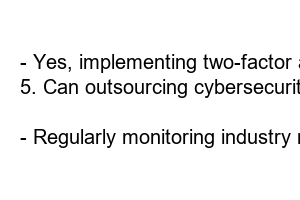세탁업 사이버 위생교육
Title: Cyber Hygiene Education: Safeguarding the Laundry Industry Against Cyber Threats
Introduction:
The rapid advancement of technology has revolutionized various industries, including the laundry industry. Today, laundry businesses rely on sophisticated systems and software for efficient operations. However, as the industry embraces digitalization, it also becomes more vulnerable to cyber threats. To combat these risks effectively, cyber hygiene education is crucial for all laundry industry professionals.
Subheadings:
1. Understanding Cyber Threats in the Laundry Industry:
The laundry industry has become an attractive target for cybercriminals due to the wealth of customer data and financial information that businesses handle. From ransomware attacks to data breaches, diverse cyber threats can disrupt operations and compromise security.
2. Importance of Cyber Hygiene in the Laundry Industry:
Proactive cyber hygiene practices minimize the risk of cyberattacks. Establishing strong passwords, regularly updating software, and implementing multi-factor authentication are core elements of **cyber hygiene** in the laundry industry. By adhering to these best practices, organizations can create a robust defense against potential cyber threats.
3. Training Employees on Cybersecurity Awareness:
Human error is often the weakest link in cybersecurity. It is vital to educate employees about the importance of vigilant cyber practices, such as avoiding suspicious emails, recognizing phishing attempts, and reporting any potential security breaches promptly.
4. Securing Laundry Industry Systems:
Laundry businesses often rely on interconnected systems, including inventory management, customer relationship management, and financial software. Regular system updates, network segmentation, and continuous monitoring play a crucial role in securing these systems against cyber threats.
5. Outsourcing Cybersecurity Services for Small Businesses:
For small or medium-sized laundry businesses without in-house cybersecurity expertise, outsourcing cyber hygiene services can offer significant advantages. Experienced professionals can help in identifying vulnerabilities, conducting routine security checks, and providing the latest security solutions customized for the laundry industry.
6. The Role of Government Regulations:
Government agencies are increasingly recognizing the significance of cybersecurity in various sectors, including the laundry industry. Strict regulations and compliance standards can help ensure that businesses adhere to robust cybersecurity practices, protecting not only themselves but also their customers’ data.
7. The Future of Cyber Hygiene in the Laundry Industry:
As the laundry industry continues to embrace digital transformation and technology advancements, cyber hygiene education must continually adapt to evolving threats. Continuous employee training, enhanced encryption methods, and regular security audits will be essential for maintaining cyber resilience.
Summary:
Cyber hygiene education has become a top priority for the laundry industry, where the stakes are high due to the sensitive information handled. By understanding cyber threats, emphasizing cyber hygiene best practices, and fostering employee awareness, laundry businesses can fortify their defenses against potential cyberattacks. Regular system monitoring, outsourcing cybersecurity services where necessary, and compliance with government regulations play a pivotal role in mitigating risks. With a dedicated focus on cyber hygiene, the laundry industry can continue to thrive in the digital era while safeguarding sensitive data and ensuring uninterrupted operations.
FAQs:
1. How often should laundry businesses update their software and systems?
– Regular updates are essential, and organizations should follow the software provider’s recommendations to maintain optimal security levels.
2. Which employees should receive cybersecurity training in a laundry business?
– All employees, regardless of their roles, need cybersecurity training to ensure a cohesive defense against potential threats.
3. What are the potential consequences of a laundry industry cyberattack?
– A cyberattack can result in data breaches, financial losses, operational disruptions, and damage to the business’s reputation.
4. Is two-factor authentication necessary for laundry industry systems?
– Yes, implementing two-factor authentication adds an additional layer of security, making it more challenging for cybercriminals to gain unauthorized access.
5. Can outsourcing cybersecurity services protect laundry businesses from all cyber threats?
– Although outsourcing cybersecurity services can provide expertise and ongoing support, prevention of all cyber threats requires a multi-layered approach that includes employee awareness and robust internal security measures.
6. How can laundry businesses stay abreast of evolving cyber threats?
– Regularly monitoring industry news, participating in cybersecurity forums, and engaging with cybersecurity professionals can help businesses stay informed about the latest threats and countermeasures.

